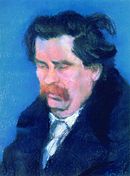- Jenő Rejtő
-
Jenő Rejtő Born Jenő Reich
29 March 1905
Budapest, Austria-HungaryDied 1 January 1943 (aged 37)
Yevdokovo, Soviet UnionOccupation novelist, dramatist Notable work(s) A láthatatlan légió, A tizennégy karátos autó, Piszkos Fred, a kapitány, A három testőr Afrikában, A szőke ciklon Jenő Rejtő (born Jenő Reich, pseudonyms: P. Howard, Gibson Lavery) was a Hungarian journalist, pulp fiction writer and playwright, who died as a forced labourer during World War II. He was born in Budapest, Austria-Hungary, on March 29, 1905, and died in Yevdokovo, Soviet Union (then under Axis occupation) on January 1, 1943. Despite the „pulp” nature of his writings, he is not only widely read in Hungary, but is also much appreciated by literary critics. It is a prevalent opinion that he lifted the genre to the level of serious art and his works will long outlive him.[1]
Contents
Biography
Jenő Rejtő completed his studies in a drama school in 1934, after which he travelled extensively throughout Europe. Returning to Hungary, he made his living as a playwright, often with great success, such as his operetta Aki mer, az nyer (Who Dares Wins, 1934).
Later, he started to write adventure novels based on his trips and experiences abroad. His novels were raised above mediocrity by his inimitable and bizarre sense of humour. His novels parodying the French Foreign Legion, written under the pseudonym P. Howard, reaped the greatest success. He also wrote a large number of cabaret farces, and edited a newspaper Nagykörút, which, however, was published just once. His most appreciated novels are stories unifying elements from detective novels and romance, always including a highly individual sense of humour. He also wrote novels in the „western” tradition.
Starting in 1939, he could not publish his novels any more under his own name because of his Jewish origins[citation needed]. In 1942, Hungarian fascists claimed in a newspaper article that he was seen writing calmly in Budapest cafés while evading the forced labour service that was compulsory for Jewish men of military age (they were forbidden to serve in the military). He was seriously ill by this time, but was taken by force from hospital to do his labour service on the eastern front, in the Soviet Union, where he soon died.[2]
Legacy
In the early years of communism his works were only available on the black market as pre-war editions, but from the 1960s on his novels were republished and they gained instant popularity in Communist Hungary. They elicit a cult following to this day. Some of his works have been made into films and comic books.
While a writer, he was a regular customer at the Cafe Japan (Japán kávéház) in Budapest, which was near Nova, his publisher. He paid for his coffee by lines written on napkins, which in turn were taken to Nova, where they were paid and collected.[3]
Rejtő's memory is kept alive in Budapest in various ways: in 2001 a street named was after him,[4] while in in 2003 there was an exhibition dedicated to him the The Petőfi Museum of Literature (Petőfi Irodalmi Múzeum).[5] In 2005 his picture appeared on a Hungarian postage stamp, part of the series "Great Hungarians", and there is an initiative to erect his statue in Budapest.[6]
Works
The original Hungarian editions of Rejtő's numerous works - the most famous of which are his Foreign Legion books and his "Dirty Fred" series - were already in the public domain in the 1990s. However, since Hungary implemented the retroactive EU copyright extension in 1999, Rejtő's works are again subject to copyright when sold in EU countries (but not in other countries). They will be in the public domain everywhere on January 1, 2014 (70 years after Rejtő's death).
English translations of some of his works are available online:
- A tizennégy karátos autó (The 14-Carat Roadster)[7]
- A szőke ciklon (The Blonde Hurricane)[8]
- Az elsikkasztott pénztáros (The Embezzled Bank Teller)[9]
Other works (selection)
- Az elveszett cirkáló (The Vanished Cruiser)
- Piszkos Fred, a kapitány (Dirty Fred, the Captain)
- A három testőr Afrikában (The Three Mousqueteers in Africa)
- Csontbrigád (Bone Brigade)
- Vesztegzár a Grand Hotelben (Quarantine at the Grand Hotel)
- A láthatatlan légió (The Invisible Legion)
Notes
- ^ Hegedűs Géza: Rejtő Jenő.
- ^ GREAT HUNGARIANS at www.posta.hu
- ^ "Life of Rejtő Jenő" (in magyar). http://www.mtklub.hu/rejto_jeno_elete. Retrieved 2009-06-18.
- ^ "Pictures of Rejto street". http://www.rejto.hu/ucca_index/. Retrieved 2009-06-18.
- ^ "The Museum of Literature Petőfi". http://www.pim.hu/object.6c0085cf-1425-408d-9287-0bc89959bbf3.ivy. Retrieved 2009-06-18.
- ^ "rejto.hu". http://www.rejto.hu/. Retrieved 2009-06-18.
- ^ Rejtõ Jenõ: The 14-carat roadster (Magyar Elektronikus Könyvtár - MEK-01021) at mek.oszk.hu
- ^ Rejtõ Jenõ: The blonde hurricane (Magyar Elektronikus Könyvtár - MEK-01022) at mek.oszk.hu
- ^ The embezzled bank teller at mek.oszk.hu
Categories:- Hungarian novelists
- Science fiction writers
- Hungarian Jews
- People from Budapest
- 1905 births
- 1943 deaths
Wikimedia Foundation. 2010.

